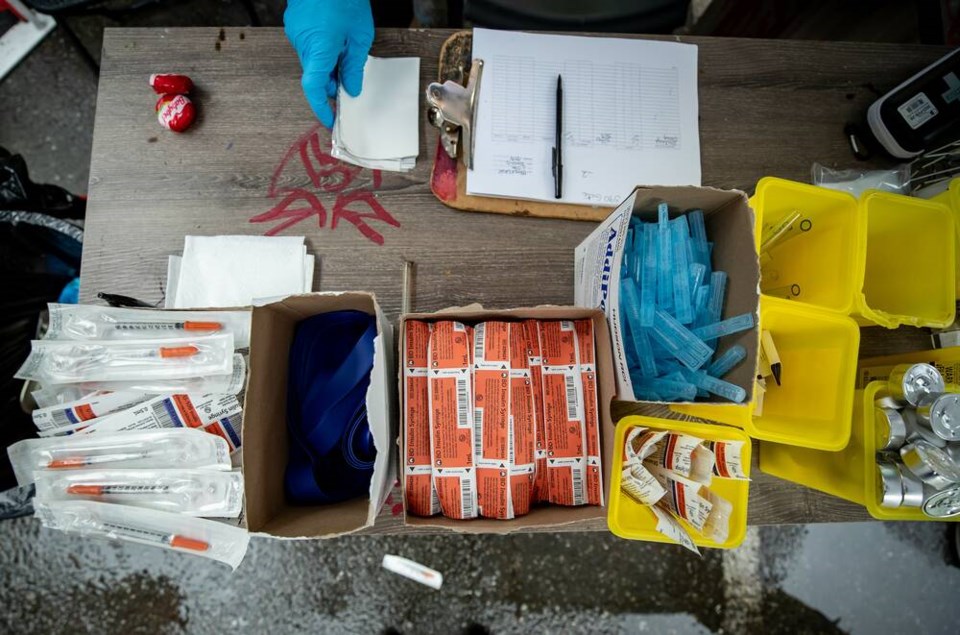In the midst of a small retreat from the decriminalization experiment that is designed to deal with the overdose-death emergency, the NDP government also stepped back on another drug front.
As debate continued on a bill to limit the places where it’s legal to use small quantities of formerly illegal hard drugs, the government ended a contract with a drug-user advocacy group that was involved in the shadowy marketing of hard drugs.
The “Drug Users Liberation Front” had part of a million-dollar contract in Vancouver to provide street-level support for drug users. It was doing drug-checking, overdose-prevention training and various harm-reduction services. But after media reports of its other activities, Opposition MLAs raised alarms.
BC United said the taxpayer-supported group was buying “heroin, cocaine, methamphetamines from organized crime on the dark web.”
“That is taxpayer-funded drug trafficking, by definition,” said Opposition critic Mike de Jong.
The claim is disputed, as the group said funding to buy clean drugs is from other sources, separate from the government contract.
But Mental Health and Addictions Minister Jennifer Whiteside told the legislature that the government has parted ways with the group. “We expect that partners will operate in a lawful manner. In this case, Vancouver Coastal Health has terminated the contract with the organization.”
Premier David Eby said Tuesday that such groups were doing life-saving front-line work, but the government’s expectation was “you don’t break the law when you’re doing this work.”
“It’s unfortunate because they were providing essential life-saving work, but they were also breaking the law.”
BC United MLA Elenore Sturko said: “This government partnered with an organization that was buying illicit drugs off the dark web and then bragging about it.”
She demanded a full audit of the contract. De Jong said Liberation Front was diverting other funds to acquire cryptocurrency used to buy illegal drugs from organized crime and cartels.
During the same argument, the government was pressed on revelations from a National Post exposé about large volumes of hydromorphone (Dilaudid) pills — dispensed for free to drug-dependent people as a safer alternative to illicit drugs — being converted through social-media platforms into money used for hard drugs.
The safe-supply model has driven their value down dramatically, but thousands of pills are being bundled and sold online by people who are marvelling in online posts at how easy it is.
People allocated 30 pills a day to steer them away from harder drugs sell them right outside pharmacies for 50 cents each to traffickers, who resell them to a wider pool of people or trade for fentanyl, said Opposition MLA Peter Milobar.
Meanwhile, the new restrictions being imposed on public use of drugs since use of small amounts was decriminalized nine months ago came under fire in the legislature.
Widespread open use of such hard drugs since February prompted civic officials to demand more limits. A number of communities imposed bylaw restrictions, but the push for a more sensible provincial law forced the government’s hand.
The bill bans usage in numerous public places, but criminal charges will only be laid if users refuse to leave the area. The first police response will be to ask users to move on or go to a supervised consumption site.
Sturko said the government failed to anticipate the consequences at the outset, leaving citizens struggling to keep businesses open, retain staff in the face of violent encounters and pay for vandalism damage.
The only restrictions imposed at the start were against using drugs near schools or in airports.
There have been reports of children finding needles in playgrounds, and in one case, a quantity of fentanyl.
Sturko said she had a faint hope that the government would rectify the problem by including the power to compel people to see a drug counsellor.
“The reason they don’t want to compel people to services is because they haven’t created adequate services. … It just remains as purely a tool to push drug users from one area to the next.”
It’s still too soon to determine if decriminalization is working as intended. But months of anxiety in many communities could have been avoided if more thought had been put into it at the start.
>>> To comment on this article, write a letter to the editor: [email protected]



